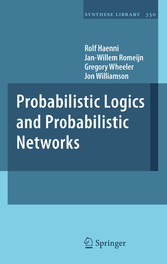Suchen und Finden
Probabilistic Logics and Probabilistic Networks
While probabilistic logics in principle might be applied to solve a range of problems, in practice they are rarely applied - perhaps because they seem disparate, complicated, and computationally intractable. This programmatic book argues that several approaches to probabilistic logic fit into a simple unifying framework in which logically complex evidence is used to associate probability intervals or probabilities with sentences. Specifically, Part I shows that there is a natural way to present a question posed in probabilistic logic, and that various inferential procedures provide semantics for that question, while Part II shows that there is the potential to develop computationally feasible methods to mesh with this framework. The book is intended for researchers in philosophy, logic, computer science and statistics. A familiarity with mathematical concepts and notation is presumed, but no advanced knowledge of logic or probability theory is required.
Rolf Haenni is professor at the Department of Engineering and Information Technology of the University of Applied Sciences of Berne (BFH-TI) in Biel, Switzerland. He holds a PhD degree in Computer Science from the University of Fribourg, for which he received the prize for the best thesis in 1996. Jan-Willem Romeijn is an assistant professor at the Philosophy Faculty of the University of Groningen. He obtained degrees cum laude in both physics and philosophy, worked as a financial mathematician and received his doctorate cum laude from the University of Groningen in 2005. Gregory Wheeler is Senior Research Scientist at the Centre for Artificial Intelligence at the New University of Lisbon. He received a joint PhD in Philosophy and Computer Science from the University of Rochester in 2002. Jon Williamson is Professor of Reasoning, Inference and Scientific Method at the University of Kent. He completed his PhD in Philosophy in 1998 and in 2007 was Times Higher Education UK Young Researcher of the Year.
Alle Preise verstehen sich inklusive der gesetzlichen MwSt.








